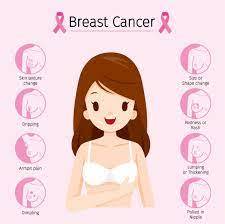Breast cancer is one of the most common cancers that affect women worldwide, and it is estimated that one in eight women will be diagnosed with breast cancer at some point in their lives. While there is no sure way to prevent breast cancer, understanding the risk factors can help women take steps to reduce their risk or detect the disease early.
There are several risk factors associated with breast cancer, and some of these cannot be changed. For instance, women who are over the age of 50 are at higher risk of developing breast cancer than younger women. Family history also plays a role, as women with a mother, sister, or daughter who has had breast cancer are more likely to develop the disease themselves. In addition, women who have inherited certain gene mutations, such as BRCA1 and BRCA2, have a significantly higher risk of developing breast cancer.
Other risk factors are related to lifestyle choices and can be modified. For example, women who drink alcohol regularly are at higher risk of developing breast cancer than women who do not drink. Smoking is also a risk factor for breast cancer, as well as many other cancers. Being overweight or obese, particularly after menopause, can increase the risk of breast cancer as well. Regular exercise and maintaining a healthy diet can help reduce the risk of breast cancer
.
Hormonal factors can also play a role in breast cancer risk. Women who have started menstruating at an early age, before the age of 12, and women who have experienced menopause later in life, after the age of 55, are at higher risk of breast cancer. Women who have never had children or who had their first child after the age of 30 are also at higher risk. Taking hormone replacement therapy (HRT) after menopause can also increase the risk of breast cancer.
It is important to note that having one or more risk factors does not necessarily mean that a woman will develop breast cancer, and many women who develop breast cancer have no known risk factors. However, knowing the risk factors can help women make informed decisions about their health and take steps to reduce their risk.
Some ways to reduce the risk of breast cancer include maintaining a healthy weight, exercising regularly, limiting alcohol consumption, avoiding smoking, and getting regular mammograms as recommended by a healthcare provider. Women who have a family history of breast cancer may also consider genetic counseling and testing to determine their risk.
In conclusion, understanding the risk factors of breast cancer is an important step in taking control of one's health. While some risk factors cannot be changed, there are many ways to reduce the risk of breast cancer through lifestyle changes and early detection. By being proactive and making informed choices, women can take steps to reduce their risk and increase their chances of early detection and successful treatment.




No comments yet
Be the first to share your thoughts!